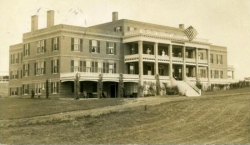Difference between revisions of "Western Maine Sanatorium"
Trickrtreat (talk | contribs) |
Jarsenault (talk | contribs) (→History) |
||
| Line 27: | Line 27: | ||
Nichols claimed to have visited all the sanatoriums in the United States and Canada and planned to build one on a mountain in rural Maine that would surpass any he had seen. He and the Association hired Portland architects John Calvin Stevens and John Howard Stevens, planned the farm that would feed patients and spread the word about what constituted effective treatment for the disease that had been known as consumption. The climate on Greenwood Mountain was as important as the design of the buildings and the methods of treatment. | Nichols claimed to have visited all the sanatoriums in the United States and Canada and planned to build one on a mountain in rural Maine that would surpass any he had seen. He and the Association hired Portland architects John Calvin Stevens and John Howard Stevens, planned the farm that would feed patients and spread the word about what constituted effective treatment for the disease that had been known as consumption. The climate on Greenwood Mountain was as important as the design of the buildings and the methods of treatment. | ||
| − | Until 1915 when the state took over control of the sanatorium, Dr. Nichols continued to raise money, oversee care of patients, deal with the Legislature, correspond with potential patients, and handle the day-to-day operations of the ever-growing facility. In 1915, the state passed a law to provide for the care and treatment of tubercular persons in three state-operated state sanatoriums. The state took over the private hospitals in Hebron and Fairfield and built a new facility in Presque Isle. The sanatoriums were given geographical designations -- Western Maine Sanatorium, Central Maine Sanatorium, and Northern Maine Sanatorium. The state capped patient bills at $5 per week. | + | Until 1915 when the state took over control of the sanatorium, Dr. Nichols continued to raise money, oversee care of patients, deal with the Legislature, correspond with potential patients, and handle the day-to-day operations of the ever-growing facility. In 1915, the state passed a law to provide for the care and treatment of tubercular persons in three state-operated state sanatoriums. The state took over the private hospitals in Hebron and Fairfield and built a new facility in Presque Isle. The sanatoriums were given geographical designations -- Western Maine Sanatorium, [[Central Maine Sanatorium]], and [[Northern Maine Sanatorium]]. The state capped patient bills at $5 per week. |
Wealthier people with TB in Maine probably went to private sanatoriums, in Maine or elsewhere in the country. Some of these facilities were much like resorts. Especially popular were sanatoriums in the southwest, where the warm, dry air was believed to be better for the damaged lungs of TB patients. | Wealthier people with TB in Maine probably went to private sanatoriums, in Maine or elsewhere in the country. Some of these facilities were much like resorts. Especially popular were sanatoriums in the southwest, where the warm, dry air was believed to be better for the damaged lungs of TB patients. | ||
Revision as of 04:45, 29 March 2016
| Western Maine Sanatorium | |
|---|---|
 | |
| Opened | 1904 |
| Closed | 1959 |
| Current Status | Demolished |
| Building Style | Cottage Plan |
| Location | Hebron,ME |
| Alternate Names |
|
History
When the Maine State Sanatorium on Greenwood Mountain in Hebron opened in 1904 to treat people with tuberculosis, it was only the fourth facility in the nation operating as a statewide sanatorium. Officially, it was the Maine Sanatorium Association that created the new institution, but Dr. Estes Nichols provided the expertise in tuberculosis treatment and the energy and vision behind the new venture.
Nichols claimed to have visited all the sanatoriums in the United States and Canada and planned to build one on a mountain in rural Maine that would surpass any he had seen. He and the Association hired Portland architects John Calvin Stevens and John Howard Stevens, planned the farm that would feed patients and spread the word about what constituted effective treatment for the disease that had been known as consumption. The climate on Greenwood Mountain was as important as the design of the buildings and the methods of treatment.
Until 1915 when the state took over control of the sanatorium, Dr. Nichols continued to raise money, oversee care of patients, deal with the Legislature, correspond with potential patients, and handle the day-to-day operations of the ever-growing facility. In 1915, the state passed a law to provide for the care and treatment of tubercular persons in three state-operated state sanatoriums. The state took over the private hospitals in Hebron and Fairfield and built a new facility in Presque Isle. The sanatoriums were given geographical designations -- Western Maine Sanatorium, Central Maine Sanatorium, and Northern Maine Sanatorium. The state capped patient bills at $5 per week.
Wealthier people with TB in Maine probably went to private sanatoriums, in Maine or elsewhere in the country. Some of these facilities were much like resorts. Especially popular were sanatoriums in the southwest, where the warm, dry air was believed to be better for the damaged lungs of TB patients.
The era of state-operated tuberculosis facilities in Maine lasted from 1915 until 1969. From the time the state took over in 1915, the Central Maine Sanatorium was designated as the facility where surgeries were performed and where patients with more advances cases of TB were sent. Presque Isle took patients of all types and performed surgery because of the difficulty of transporting patients from northern to central Maine. Hebron and Presque Isle both closed in 1959.


